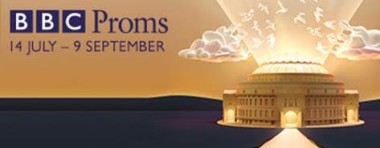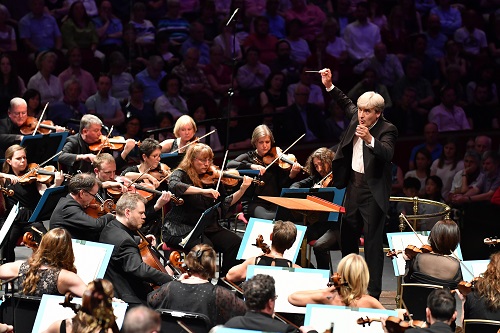
 United Kingdom 2017 BBC Proms 37 – Rachmaninov: Alexander Gavrylyuk (piano), BBC Scottish Symphony Orchestra / Thomas Dausgaard (conductor), Royal Albert Hall, London, 13.8.2017. (RBa)
United Kingdom 2017 BBC Proms 37 – Rachmaninov: Alexander Gavrylyuk (piano), BBC Scottish Symphony Orchestra / Thomas Dausgaard (conductor), Royal Albert Hall, London, 13.8.2017. (RBa)

Rachmaninov – Piano Concerto No.3 in D minor, Symphony No.2 in E minor
The first of two Sunday Proms began at 6 pm. on what amounted to the 2017 season’s Rachmaninov Day. This fell in a year which includes all four piano concertos: Numbers 1 and 4 at Proms 63 and 60 respectively.
The auditorium was packed to the rafters. The days when the cognoscenti disdained Rachmaninov’s works are behind us… at least for now; either that or they are keeping away. This composer is now almost as popular as Tchaikovsky.
Each of the two parts of the concert was preceded by a ten-minute choral piece, while orchestra and conductor waited reverentially on the concert platform. Part I had the Latvian Radio Choir perform unaccompanied Thy Tomb, O Saviour as they processed into the auditorium in pairs, women first, moving in a visual echo of a cathedral processional, singing alternating between women and men. They passed through from the stalls entrance (rear central) down the steps into the thronged Promenade arena, around the raised camera island (the concert was being filmed for BBC4) and disappeared left below the concert stage. The whole procession was minutely timed, so that the last chords resounded into silence. The piano concerto started with no pause as the echo of the chant ended. This was a lavishly imaginative and risk-taking gesture; after all the choir was moving right through the body of Prommers with no barriers at all. It worked movingly, so credit to whoever took this decision.
Alexander Gavrylyuk was making his Prom premiere. There was a strikingly collegiate approach between pianist and conductor. Dausgaard frequently, and for extended periods, kept animated eye contact with Gavrylyuk, totally engulfed by the music. Here was a pianist in command of the music and the music in command of him. This Ukrainian pianist impressed by his fluid projection of the music’s quiet confidences and silvery tendrils. Bassoon, horns and trumpets distinguished themselves. Only the body of violins (first and seconds split left and right) lacked the plush tonal weight I would ideally have wanted. Gavrylyuk, in the second movement, astonished with his leisurely floating mayfly treatment before a taut finale, in which time and again the stopped horns leered atmospherically over the pianist’s statements. There was excitement and drama of course, and this washed over the audience, culminating in that final crashing wave. The applause was emphatic. Gavrylyuk gave an encore in the shape of a delicately chimed arrangement of Rachmaninov’s Vocalise. It is a measure of Dausgaard’s integrity that at the last he did not return to the podium before the interval.
After the interval came the Second Symphony, but again preceded by the Latvians’ chant, this time sung from the extreme heights of the hall, centre rear and slightly offset to the right. The distance of the hall’s Choir level lent delicacy to the fervour, as the voices echoed ethereally around this cavernous space.

The Symphony started again without any pause—as if the music had evolved from the chant. You might have expected a crashing of gears but the transition worked a treat. Dausgaard allowed the first movement to unwind its soulful way and a host of details floated free. The French horns were among the heroes of the evening. All those muted horn passages were a pleasure in all their sinister creaking and groaning majesty. I ended up watching out for their interventions—solo or en masse—throughout the Symphony. They were not the only stars: I greatly enjoyed the cor anglais’s solo role in that long first movement. Dausgaard had the orchestra romping through the second movement, while the great Adagio rose stretched and curved in unhurried tender majesty. At the end of this epic movement Dausgaard held his arms still, frozen for a long extended moment as if to preserve the invoked silence. The finale burst in, as it should, in a whooping whirlwind, with the players pressed forward and building galvanic climaxes out of the composer’s characteristically chuckling figures.
The concert was televised (with an hour’s delay) for BBC 4. Quite apart from the centre-island podium camera, another was in action on a boom off to Dausgaard’s right and a mobile camera moved along the breadth of the front of the orchestral stage and up and down both wings.
Dausgaard conducting with baton is something of a Bernstein on the podium, moving around a great deal but with his feet planted firmly on the podium. Upper body movements and wide-sweeping arm gestures defy any suggestion of an impassive approach. He will have won many a new admirer as a result of this concert. I am one of them.
It is a sign of the times that for me this was the second performance of the Second Symphony in the last six months.
Rob Barnett
P.S. I wonder: did Bernstein ever conduct Rachmaninov’s Second Symphony? As far as I can see, he did not record the work.
No, Bernstein did none of the Symphonies (which Ormandy seemingly owned in the CBS stable). In the 60s, he did record the 2nd Piano Concerto with Philippe Entremont, then again with Gary Graffman — with Paganini Variations. Later he did the 3rd Piano Concerto with Alexis Weissenberg for EMI.